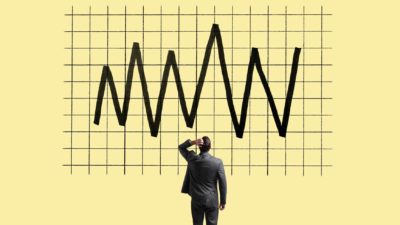So, the US Federal Reserve (their version of our RBA) cut interest rates by 0.5%, overnight.
For the first time in four years.
It is, make no mistake, a meaningful and consequential change, economically.
It suggests that the US Fed believes inflation is essentially under control, over there, at least.
And it suggests that the Fed is of the view that the risks in the economy are relatively evenly poised – between too much growth and inflation on the one hand, and too little growth and recession on the other.
Which… is probably good news for the US economy.
So, what does it mean for Australia?
Well, the RBA is the last central bank standing, when it comes to cutting interest rates.
Now, our inflation rate is a full percentage point higher than the US.
And RBA Governor Michele Bullock has said we shouldn't expect rate cuts this year.
That said, she's also said the RBA will continue to be 'data dependent', so nothing is ruled in or out.
And what does it mean for our investing?
Are you ready?
Nothing.
Absolutely nothing.
Not a thing.
Is that clear enough?
But… how can that be?
Surely we need to factor in lower rates and the impact on inflation and the economy, and bond rates and…
Nope.
We really, really don't.
Let me explain.
I'm a long term investor. A phrase that Motley Fool co-founder David Gardner argues, convincingly, should be a tautology.
Because what is investing, if it's not long term?
You can be a trader, or a speculator, if you choose. And good luck (I mean that both literally, and as a warning).
Or you can be an investor.
In which case, you'd look at the business in front of you, assess its track record, its health and its likely long-term future trajectory.
Then you'd look at the current share price and ask yourself if that represents good value, based on the qualitative assessment, above.
What wouldn't you do?
Well, if your time horizon is measured in years, preferably five or more, you wouldn't worry about the current level of inflation. Or next quarter's economic growth.
For two reasons:
1. The past is the past, and the future is unknowable; and
2. Whatever happened in the past three months, or happens in the next three months, is very unlikely to impact the long term future of the business you're looking at.
There's one important exception I'll get to, in a minute, but that's essentially it.
Knowing the current GDP growth doesn't help you work out how many computers JB Hi-Fi Limited (ASX: JBH) will be selling in 2032.
Knowing the current iron ore price tells you nothing about how much money BHP Group Ltd (ASX: BHP) will make in 2033.
Knowing that the Fed just dropped interest rates has zero impact on how many cochlear implants Cochlear Limited (ASX: COH) will sell, worldwide, in 2034.
The exception to ignoring interest rates and inflation? Survival.
It's fine to think about 2033, 34 or 35, but that assumes a company will be alive by then. And economic growth and/or interest rates can be very consequential, if the company is running close to breakeven, or is carrying a big pile of debt.
Of course, in theory you've already accounted for that in your assessment of business quality, but it's worth repeating here. A company with a lot of debt can be severely (potentially fatally) compromised when rates rise. A company with thin profit margins, selling a discretionary product, can face an existential crisis if consumers or businesses close their wallets.
Frankly, you probably shouldn't be investing in those sorts of companies, anyway. If the vagaries of the economy or central bank decisions are likely to be the difference between life and death for a company, I'd give it a very, very wide berth.
Yes, interest rates and inflation are very consequential for our economy. Business will rise and fall. People will lose jobs, or gain them. Ditto housing. It's very important that our policy-makers get these things as right as possible. And in that sense it's remarkably important.
But, for my investing? It is totally, completely and unequivocally just noise and/or potential distraction, best ignored.
Because here's the thing:
The good lord willing and the creeks don't rise, I'm going to be invested for decades from now. Right up to, and during, retirement.
Over that time? Inflation will rise and fall. Interest rates will rise and fall. Economic growth will rise and fall.
But also? Corporate profits will probably rise (a lot) and fall (a little), then rise (a lot) more and fall (a little) and so on. At least, that's my best guess, based on history and my view of democratic capitalism.
And if that's true?
Well, I could try to make a living playing bluff and double bluff against other short-term traders and speculators. I could presume I know better than them, and try to beat them at their own game. My ego wants to believe I could. (So does yours. It's how we're built.) But am I going to beat the professional fund managers, and algorithmic traders?
Or, I could harness that power of democratic capitalism. I could look for quality companies with strong businesses and bright futures, then, well, let them do their thing, over the long term.
Which is, as you know by now, exactly what I do, and will continue doing.
Will BHP, Cochlear and JB Hi-Fi have highs and lows over the next 1, 3, 5 and 10 years? Almost certainly.
As will almost every company.
Will their share prices be volatile? Probably.
On a daily, weekly and monthly basis, share prices are simply the sum total of the emotions of those who are buying and selling.
But over the long term? Well, price tends to follow value. The cream rises to the top.
And short term volatility fades as the long term story plays out.
I hope the RBA gets its interest rate decisions right, for the sake of Australian workers and Australian businesses.
Australian investors, however – proper, long-term investors – have little to gain from worrying about cyclical changes in economic circumstances.
We should, instead, keep our eyes on the horizon. Because that's where we'll find the long term value creation that comes from democratic capitalism, which we can partake in by being shareholders in the best ASX (and US) businesses, and in the market as a whole!
Fool on!








